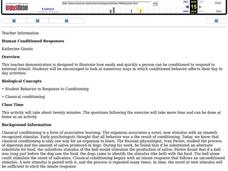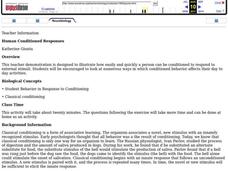Curated OER
Human Conditioned Responses
Learners participate in a demonstration designed to illustrate how easily and quickly a person can be conditioned to respond to external stimuli. Students look at numerous ways in which conditioned behavior affects their day to day...
American Psychological Association
Psychology Goes to Madison Avenue
As part of a study of well-known psychologists, class members create a name, a business logo, an advertisement for TV, online, radio, or print, and a pamphlet for the business run by one of the psychologists on a provided list. An...
American Psychological Association
Facebook Activity
Imagine if Sigmund Freud or Charles Darwin had a Facebook page. As part of a study of major historical figures in the field of psychology, class members are assigned a psychologist and design a mock Facebook page that includes...
Curated OER
Types of Behavior: Animal Behavior Research
How does one determine what influences animal behavior; Is it nature or nurture? After a short reading explaining different types of conditioning and other learned behaviors, scholars examine six scenarios to determine whether the...
Curated OER
La Belle Époque [1871-1914]:
Progress through various aspects of the "The Beautiful Era" in this presentation. Political, technological, and scientific contexts surround the time of innovation and change in the world landscape. The short length of this slide...
Curated OER
Human Conditioned Responses
Students listen as the teacher demonstrate how easily and quickly a person can be conditioned to respond to external stimuli. Students are encouraged to look at numerous ways in which conditioned behavior affects their day to day...
Famous Scientists
Famous Scientists: Ivan Pavlov
Learn about the famous studies of Ivan Pavlov in this article. Also discussed in the article is his life.
Nobel Media AB
The Nobel Prize: Pavlov's Dog
You have to use the principles behind Pavlov's conditioning experiments in order to play this game and get the dog to drool when he hears a sound. You can also get more information about Ivan Pavlov and his research.
TED Talks
Ted: Ted Ed: The Difference Between Classical and Operant Conditioning
Peggy Andover explains how the brain can associate unrelated stimuli and responses, proved by Ivan Pavlov's famous 1890 experiments, and how reinforcement and punishment can result in changed behavior. [4:13]
Nobel Media AB
The Nobel Prize: The Nobel Prize in Physiology or Medicine 1904
At this site from The Nobel Foundation you can read about Ivan Petrovich Pavlov (1849-1936 CE) who earned the 1904 Nobel Prize in Medicine for his "Work on the physiology of digestion." This website is organized into the following...
York University
Classics in the History of Psychology: Psychology as the Behaviorist Views It
Classical article by John B. Watson (one of the founders of Behaviorism) defining his views on Behaviorism.
York University
Classics in the History of Psychology: Supersition in the Pigeon: B. F. Skinner
Classic study by B. F. Skinner concerning learned behavior in a pigeon.
Sophia Learning
Sophia: Classical Conditioning
This lesson will examine the principles or origins of classical conditioning.






![La Belle Époque [1871-1914]: PPT La Belle Époque [1871-1914]: PPT](http://content.lessonplanet.com/resources/thumbnails/292406/large/cgrmlwnvbnzlcnqymdeymtewoc0zmdqxni1ncdjpenquanbn.jpg?1414487063)






